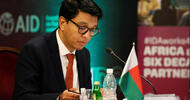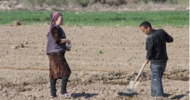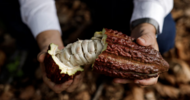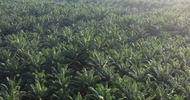The world is in transition from an era of food abundance to one of scarcity. Over the last decade, world grain reserves have fallen by one third. World food prices have more than doubled, triggering a worldwide land rush and ushering in a new geopolitics of food. Food is the new oil. Land is the new gold.
Japanese translation of article of GRAIN, "Pension funds: key players in the global farmland grab"
Russia is in talks with Japanese companies to secure investment in Siberian farmland and Pacific ports that would allow the world's No. 3 wheat exporter to carve a greater share of Asian markets, a senior grain official said.
Rattled by rapidly rising global grain prices, China is looking at strategies to ensure long-term food security for its 1.3 billion people such as procuring farmland overseas and opposing the formation of any international grain price-fixing monopolies.
New GRAIN study finds changed conditions in international “land grabs.”
- Circle of Blue
-
24 June 2016
"The urgent need is to find countries where India can grow its pulses and its grain, because India's farms may not be enough," says the director of Adani Logistics Ltd
By 2008 global grain prices were reaching record levels, and Swedish, British, Chinese, and Korean investors were piling into Russian farmland.
Sovereignty trumps contractual obligations every time. If the African countries that are leasing their land fall into difficulties in feeding their own populations, as they are likely to do if world grain prices rise sharply, the first resource they will turn to is the foreign plantations on their territory.
Huge investment funds have already poured hundreds of billions of dollars into booming financial markets for commodities like wheat, corn and soybeans. But a few big private investors are starting to make bolder and longer-term bets that the world’s need for food will greatly increase — by buying farmland, fertilizer, grain elevators and shipping equipment.
- New York Times
-
05 June 2008
In March 2004, an agreement was signed between southwest China's Chongqing Municipal government and the Lao government to cooperatively build a comprehensive agricultural park in Laos for Chinese enterprises to produce grain. Leasing farmland overseas to produce grain has become a new way for China, a country with the world's greatest population but comparatively scarce soil resources, to solve its food supply problem.
Alexander Tkachev, a former Russian agriculture minister, heads a family company that Ukrainian grain growers say has taken control of hundreds of thousands of acres of their land.
A recent comprehensive survey by GRAIN, examining data from around the world, finds that while small farmers feed the world, they are doing so with just 24 percent of the world's farmland.
In some of the countries where the land investments are being made, people will block the trucks that are hauling the grain from the fields to the ports, says Lester Brown in this interview with NPR
Estados nacionales –por cuenta propia o a través de compañías relacionadas– realizaron o están gestionando la compra de tierras productivas localizadas en su mayor parte en naciones de África subsahariana y Latinoamérica. Así lo indica un trabajo reciente del Banco Mundial –publicado el pasado 7 de septiembre– al citar datos recopilados por la ONG internacional GRAIN
- Más Producción
-
20 September 2010
The Korean corporation aims to secure 850,000 ha of arable land and produce grain through joint ventures in major farming countries such as Australia, North America and South America.
- Business Korea
-
05 May 2023
GRAIN’s report accuses the Siva Group of land grab in many countries across South America, Africa and Asia
Hassad has invested in international institutions and companies operating in the grain, meat, poultry, livestock and fish sectors, in a number of countries such as Australia, Canada, Turkey, Oman, Saudi Arabia, and Sudan.
- The Peninsula
-
20 April 2022
People's Coalition on Food Sovereignty, GRAIN, and Ponlok Khmer urged the government of Cambodia to return disputed land from Chinese company Hengfu Group Sugar Industry to the Khmer and Indigenous Kuy communities. The groups expressed solidarity with the Indigenous Kuy people who continue to assert their legitimate land rights even amid the global health crisis.
JBA Holdings, a joint venture involving Heilongjiang Agriculture Co. and Joyvio Group, will invest $100 million in a soybean crusher and grain port in Russia, and will lease 100,000 ha to grow wheat, corn and soybeans.
- Bloomberg
-
04 September 2018
A consortium of Saudi groups - comprising dairy giant Almarai, grain importer Al Rajhi and Salic, the agriculture arm of the country's sovereign wealth fund - agreed to pay US $92mn to acquire Continental Farmers Group located in northern Poland and western Ukraine
About 60 Korean companies were involved in farming in 16 countries by the end of 2010, harvesting about 87,000 metric tons of grain from 24,000 hectares of farmland.
South Korea, Asia’s second-biggest grain importer, will lend money and give technology to companies to develop farms overseas to ensure the nation’s food security after prices surged last year.
ADECRU y GRAIN denuncian y repudian públicamente el Proyecto de Desarrollo del Valle del Río Lúrio y expresan su preocupación e indignación al respecto.
Vicstock Grain and its Chinese backers (Beidahuang) have dramatically scaled back their cropping operations in the Wheatbelt three years after a $70 million spending spree on farmland.
- West Australian
-
07 May 2015
Argentina, Brasil y Bolivia han reaccionado al fenómeno adoptando restricciones a la propiedad extranjera de la tierra, sin embargo Grain advierte de que las barreras que están creándose contra la inversión extranjera resultan endebles.
"They're not talking about $2 or $3 million, they're talking about $20 million to up to $1 billion of investment in big projects," Peter Metcalfe, the director of grain industry development for Western Australia, said in an interview.
Canada's Blended Finance Project interviews Witness Radio and GRAIN about the role public development banks play in facilitating land grabs around the world.
Small farmers grow 70% of world's food but the land which they control is shrinking as mega-farms squeeze them onto less than 25% of the world's available farmland, says new analysis by GRAIN
Black Earth Farming lauded the Russian government's decision to keep grain export markets open, despite a poor national harvest, crediting it for helping the group achieve its best quarterly results as a listed company.
- Agrimoney
-
23 November 2012
Ecco perché gli attuali sforzi internazionali per regolare la speculazione sulla terra faranno peggiorare le cose: il rapporto dell'ong Grain
- Food We Want
-
27 August 2012















